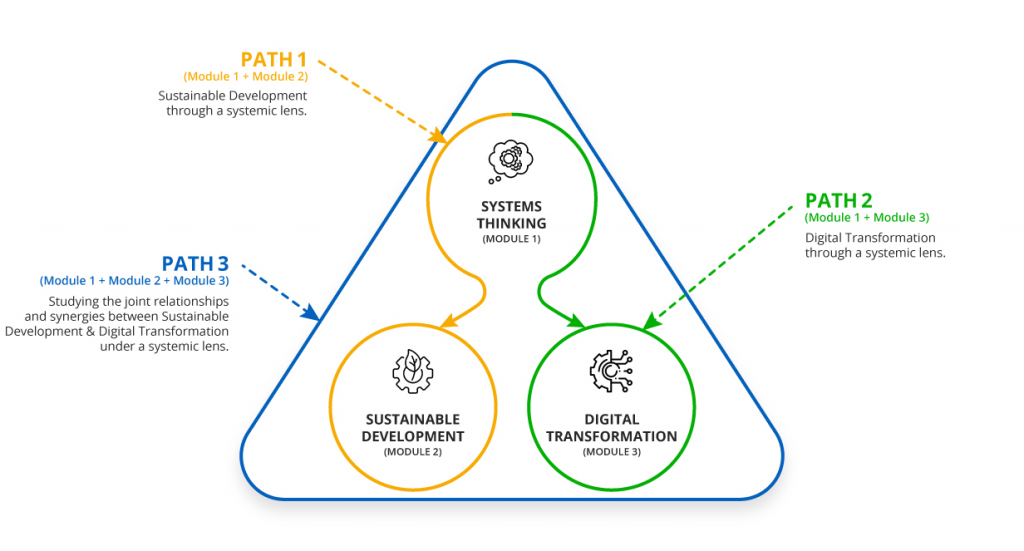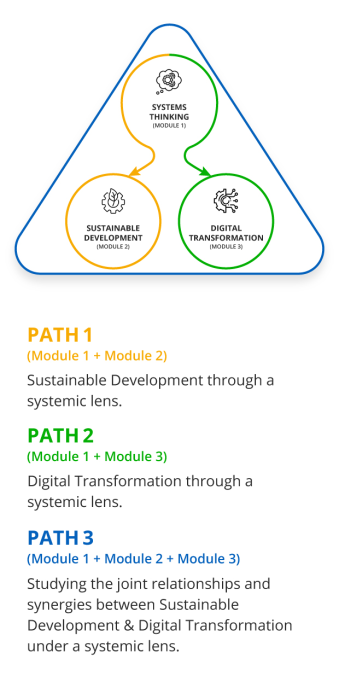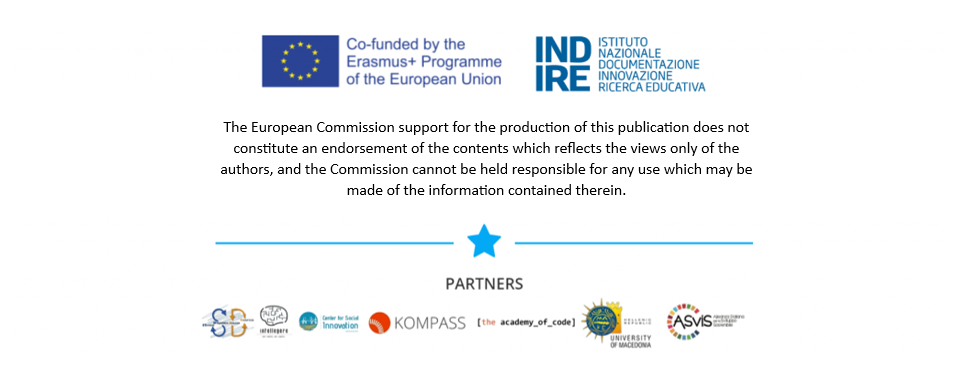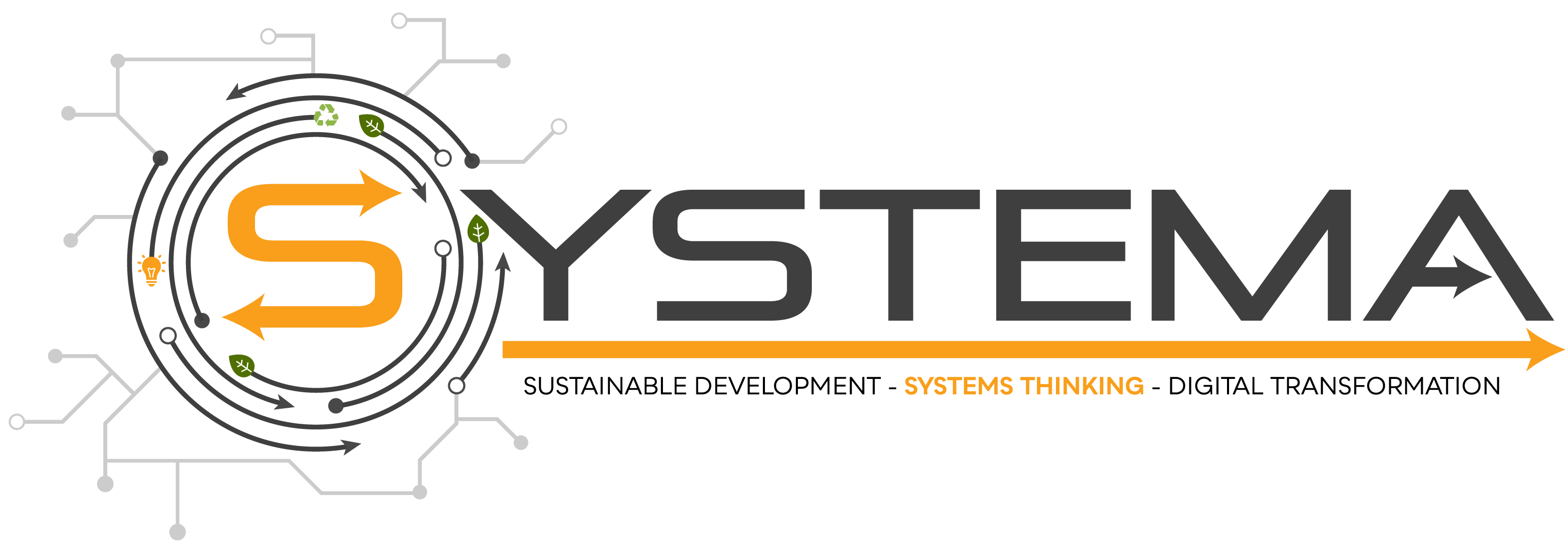FREE COURSE
Course Highlights
- Course duration: max 40 hours for the entire course (depending on the chosen training path)
- Subjects: Systems Thinking, Sustainable Development and Digital Transformation
- Course type: self-learning online lectures and related assessment tests
- What you get: innovative systemic skills to manage Sustainable Development and Digital Transformation in organizations
How to register for the SYSTEMA Course
You can immediately enroll for the SYSTEMA Course by registering here.
By providing the required information, you will receive an email with your course access credentials (login and password) to the Moodle Platform. Accessing with your credentials, you will then be able to start the course, at the end of which you will be asked to answer a final evaluation survey.
What is the SYSTEMA Course
The SYSTEMA Course is an educational program developed through the E+ funded SYSTEMA Project (details below) in favor of educators, managers and students, and aimed at introducing a systemic perspective (through the Systems Thinking approach) in two important (and nowadays extremely “hot”) topics like Digital Transformation (DigTx) and Sustainable Development (SusDev).
The need for Systems Thinking is becoming clearer and clearer every day. In fact, such a perspective will allow addressing the complex, interdependent and dynamic issues happening not only inside each of these two subjects but also across them! Indeed, one cannot successfully transform an organization without rethinking how business/services are offered in a digital way on a daily basis: in other words, organizations do not only need to be digitally redesigned internally but also in the way they interact with their external stakeholders (providers, customers, context, environment, etc.). And you can’t conceive digital transformation without accounting for organizational and business changes that are sustainable for the organization AND for the environment.
Systems Thinking is the lens of intelligent organizations that need to design such transition inside a global process aiming at sustainable development!
The course that you are about to follow is provided FREE of charge (since it was funded by the Erasmus+ Programme) and we hope that it will grant you a brand new perspective not only on Sustainable Development and Digital Transformation but (thanks to Systems Thinking) also on how you approach your personal and professional life every day!
What is SYSTEMA
SYSTEMA is a project Funded under the ERASMUS+ Programme, Key Action 2 – Strategic Partnerships (Agreement n°: 2020-1-IT02-KA204-080082
What are its Objectives and Expected Outcomes
The objective of the SYSTEMA project is to prepare and train in Systems Thinking the next generation of people that will become the trainers, managers and strategists of tomorrow and that will be increasingly needed in public and private organizations across Europe to cope with the important changes that are more and more needed in the face of global threats.
Read More About Systema Project
Why the SYSTEMA education?
By acquiring Systems Thinking and System Dynamics skills, trainees will be able to think differently and out of “pre-cooked” and mainstream thinking schemes, being able to fully consider problems before urging conclusions. They will be able to answer the right questions rather than provide the right answers to the wrong questions! And they will be able to apply such a new and innovative thinking scheme vertically in Sustainable Development issues as we as Digital Transformation ones, two fundamental topics that nowadays are deeply connected and are characterizing the development and change of modern and intelligent organizations.
Once trainees have acquired these skills and competencies, they will be in the position to train other systems thinkers as well as train people to a systemic understanding of the systemic caveats in sustainable development and digital transformation.
So, you should attend SYSTEMA courses because:
- you will acquire system Systems Thinking mindset and skills that will help you to live and work in a complex world
- according to the most important analysts, Systems Thinking will be one of the most requested skills in the next 20 years
- you’ll achieve a wider and deeper comprehension of Sustainable Development issues as well as Digital Transformation ones, and how these issues are connected
- we are working to provide you, upon successful completion of the course, with some EU-recognized educational credits, called Microcredentials (Details here: https://data.consilium.europa.eu/doc/document/ST-9237-2022-INIT/en/pdf ). More info on this will be provided to participants upon registration to the SYSTEMA course.

Course details & educational paths
- Target users: students, trainers, consultants, managers, policymakers
- Occupational outcomes: Sustainability Manager, Digital Transformation Manager, Compliance Manager
- Language: English
- Online self-monitored course
- Certification of Educational Credits offered through EU micro-credentials
- Course Fee: free (the project is funded by the KA2 Erasmus+ EU programme)
- The course includes theoretical knowledge, case studies, videos, learning activities and quizzes, in order to provide a more holistic picture of each topic
Possible educational paths


Module 1 (lectures 1.0 to 1.4): Systems Thinking (ST)
- Course title: Harnessing the power of Thinking in Systems: from the basics to intermediate skills
- Duration: 14 hours
- Prerequisites: None in particular.
- Lectures and topics:
- Lecture 1.0: Introduction to Systems, Models and Simulation (2 hours)
- Lecture 1.1: Key concepts and tools for Systems Thinking (3 hours)
- Lecture 1.2: Fundamentals of Systems Thinking and System Dynamics (3 hours)
- Lecture 1.3: Systems Thinking and System Dynamics applied to Sustainable Development (3 hours)
- Lecture 1.4: Systems Thinking and System Dynamics applied to Digital Transformation (3 hours)
- Educational goals: Let the trainees familiarize with the basics of Systems Thinking and System Dynamics and then contextualize the new skills in the interdependent fields of Sustainable Development and Digital Transformation by means of a few application examples
- Outgoing skills & knowledge:
- Thinking in Systems
- Deeper and sounder holistic perspective
- Capability to create connections among seemingly different problems and issues
- Identify cause-effect relationships inside and across systems
- build qualitative systemic maps through causal-loop diagrams
- identify most common systemic structures
- identify the key elements of systems (accumulation-stocks, flows, presence of delays and non-linearities, presence of interdependence and feedback loops, presence of reinforcing Vs balancing dynamics of systems, presence of carrying capacities and erosion of the capability of resources to renew themselves)
- Educational credits/credentials: TBD
Module 2 (lectures 2.1 to 2.4): Systems Thinking for Sustainable Development
- Course title: Systems Thinking for Sustainable Development
- Duration: about 8 hours
- Prerequisites: Systems Thinking knowledge
- Modules and Topics:
- Lecture 2.1: Introduction to Sustainable Development (definitions, models, SDGs)
- Lecture 2.2: Sustainable Development and Systems Thinking (theory and practical applications
- Lecture 2.3: Skills for Sustainable Development (soft, hard and green skills)
- Lecture 2.4: Setting, measuring and assessing Sustainable Development Goals (KPIs, impact measurement etc)
- Educational goals:
- 1. Learn about sustainable development and various models and frameworks as well as the UN Sustainable Development Goals (SDGs).
- 2. Learn about systems thinking and understand the relationship between systems thinking and sustainable development
- 3. Learn about essential sustainability skills that are important for every business professional.
- 4. Learn how to set, measure and assess the impact of sustainability goals
- Outgoing skills and knowledge:
- Educational credits/credentials:
Module 3 (lectures 3.1 to 3.4): Systems Thinking for Digital Transformation
- Course title: Systems Thinking for Digital Transformation
- Duration: about 12 hours
- Prerequisites: Systems Thinking knowledge
- Modules and Topics:
- Lecture 3.1: State of the Art on Digital Transformation - setting the context
- Lecture 3.2: Why Systems Thinking can support Digital Transformation
- Lecture 3.3: How Systems Thinking can enhance skills for Digital Transformation
- Lecture 3.4: Business Cases of Systems Thinking use in Digital Transformation
- Educational goals:
- To gain knowledge regarding the state of art on Digital Transformation processes
- To gain an institutional framework regarding Digital Transformation
- To learn about the main aspects of Digital Transformation processes
- To learn how Systems Thinking can support/enhance Digital Transformation processes
- To learn how Systems Thinking can be applied to Digital Transformation
- To gain a framework for Design Thinking and Systems Thinking
- To learn how to apply the main skills of System Thinking to Digital Transformation Processes
- To gain the main Tools of System Thinking
- To develop skills useful for managing complexity
- To gain a framework of some business cases of Digital Transformation processes and System Thinking
- To deepen why some cases failed
- To learn some lessons and best practices from famous cases
- Outgoing skills and knowledge:
- Educational credits/credentials:
What we offer to the participants:
- quality courses and content
- formal evaluation of acquired knowledge and skills
- educational credits and attendance certification
- technical support and help desk


Minimum required achievements for certification:
- course completion (at least one of the available educational paths)
- formal evaluation test passed (related to the completed educational path)
Registration form
COURSE MANAGEMENT: Dr. George Tsaples - University of Macedonia - Thessaloniki, Greece
SCIENTIFIC COORDINATOR: Prof. Stefano Armenia - System Dynamics Italian Chapter - Rome, Italy
Contacts & Info: systemaerasmus@gmail.com

